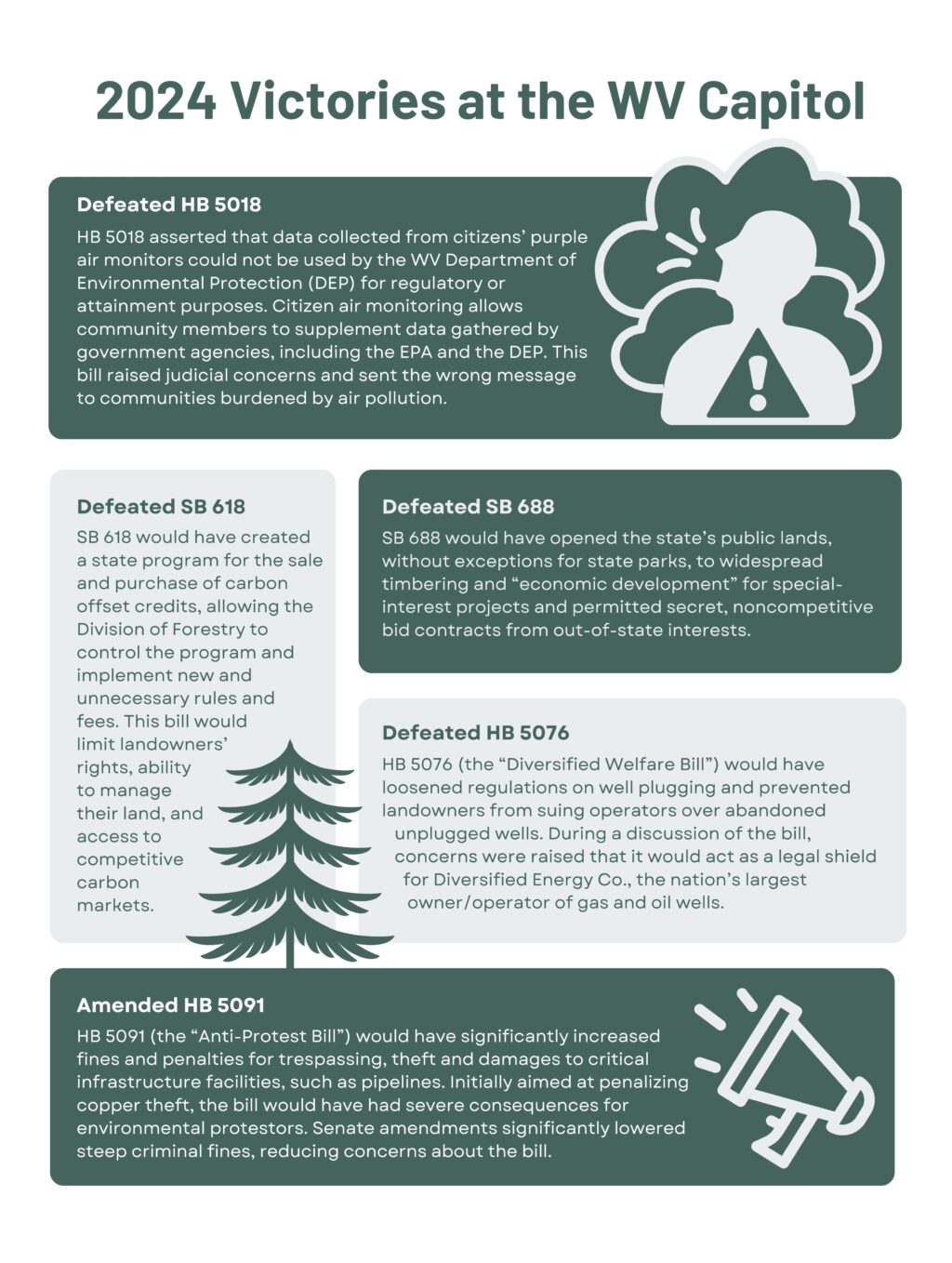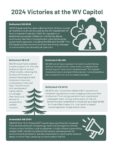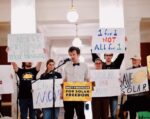- Share on Facebook
- Like
- Digg
- Tumblr
- VKontakte
- Buffer
- Love This
- Odnoklassniki
- Meneame
- Blogger
- Amazon
- Yahoo Mail
- Gmail
- AOL
- Newsvine
- HackerNews
- Evernote
- MySpace
- Mail.ru
- Viadeo
- Line
- Comments
- SMS
- Viber
- Telegram
- Subscribe
- Skype
- Facebook Messenger
- Kakao
- LiveJournal
- Yammer
- Edgar
- Fintel
- Mix
- Instapaper
- Copy Link
- Bluesky
By Isabel Stellato and Lucia Valentine, WVEC Lobbyists
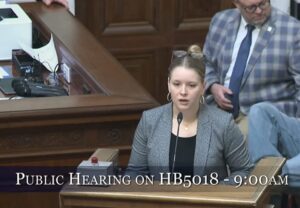
“If you care about your community and your constituents, then it is imperative that you care about pollution in people’s neighborhoods.” – Lucia Valentine, WVEC Lobbyist
Any legislator, lobbyist, or press member who spent the past two months at the Capitol can affirm that the 2024 session was anything but ordinary. One lawmaker told us it was the worst session they’d seen in over a decade. It’s not surprising, then, that while we hoped to get several proactive bills like the Orphaned Well Prevention Act and Community Solar passed, most of our efforts went toward defeating harmful bills instead. One of our biggest accomplishments was defeating HB 5018 (restricting the use of community air monitoring data), an industry-backed bill that stubbornly survived until the last few days of session. We defeated the bill with our vigilant member groups and a community of concerned citizens ready to mobilize at a moment’s notice.
There were many difficult moments, and at times, we felt powerless in the face of strong oppositional forces. Despite our lobbying efforts, industry-backed SB 171 (limiting local autonomy) passed into law. In those moments, it helped to recall our past successes, strategies that worked over time, and decades of community building that brought us into the present. Read on for key moments throughout the 2024 session!
Bills of Concern That Passed
HB 5091 – Critical Infrastructure Protection Act
Also known as the “Anti-Protest Bill,” HB 5091, in its original form, proposed significantly increased fines and penalties for trespassing, theft and damages to critical infrastructure facilities, such as pipelines. The bill was initially aimed at penalizing copper theft but would have had severe consequences for environmental protestors. For example, the fine for trespassing would have increased the range from $250-$1,000 to $2,500-$10,000, and fines for vandalizing or defacing a facility would have increased the maximum penalty from $5,000 to $100,000. The bill was amended in committee and ultimately passed with significantly lower fines than those in the proposed changes. While the bill’s passing is not ideal, we give a shout-out to the WV Citizen Action Group for working diligently to get it amended.
HB 5013 – Redefining Managed Timberlands
HB 5013, similar in its original form to SB 822, which died (read on), would have made it so that land under conservation easements would not be eligible for timberland management designation if the easement is prohibitive of commercial timbering. This would have barred many landowners from the tax break that comes with participation in West Virginia’s managed timberlands program. Fortunately, the Senate amended the bill to permit managed timberland agreements even if there is a conservation easement. The bill also allows forests in a subdivision to have the managed timberland designation, which is good. Overall, this bill could have been better but could have been much worse. Some of our member groups will watch how the bill is implemented and provide updates for the 2025 session. Thank you to our partners at WV Rivers Coalition, West Virginians for Public Lands, WV Highlands Conservancy, Sierra Club WV, and WV Citizen Action for their work on this bill.
SB 171 – Prohibiting county commissions from adopting authorization that exceeds state law regarding agriculture operations
SB 171 was fast-tracked through the Senate early in the session and went on to pass unanimously in the House. It restricts county commissions from adopting ordinances or regulations that exceed state laws concerning agricultural operations, which could pose several threats to local autonomy. This bill also has environmental implications. If state laws are less stringent around the use of pesticides, for example, local communities would not be able to enforce stricter regulations to protect their public health, air quality, and water quality. We will monitor this bill’s implementation to ensure that communities remain protected.
Good Bills That Died
SB 638 – Community Solar Pilot Program
Two Community Solar Pilot Program Bills were introduced this session: SB 638 and HB 5626. Neither was taken up in committee despite robust grassroots and lobbying efforts. Community Solar would benefit West Virginians by reducing our reliance on fossil fuels and lowering our electric utility costs. Passage of the bill would provide a huge influx of private investment in renewable energy as it has in 22 other states. We will continue to advocate for establishing a community solar program in West Virginia in 2025. Thank you to our partners at Solar United Neighbors, West Virginians for Energy Freedom, and WV Citizen Action Group for working so hard on these bills.
HB 5422 – Net Metering
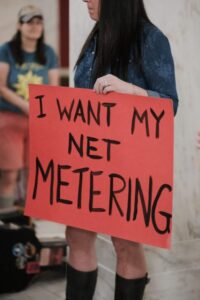
Solar supporters rally at a WV Capitol rally on January 27, 2024. A crowd of over 200 advocates spoke out against a Mon Power and Potomac Edison proposal to change their net metering setup for solar credits. Photo by West Virginians for Energy Freedom
HB 5422 (similar to SB 869), which would have required the Public Service Commission (PSC) to uphold the full retail credit for net metering in West Virginia, died this year after neither bill made it onto their respective committee agendas. This bill would have encouraged net metering across the state and positively impacted future community solar programs. These bills were introduced in response to the rate case filed at the PSC. During the session, a settlement with First Energy, Solar Holler, Solar United Neighbors, and our partners at West Virginians for Energy Freedom was announced around the session’s halfway point. It locks in the net metering credit at roughly 9.3 cents per kilowatt-hour for commercial and residential owners. Thanks to everyone who sent comments to the PSC and our partner groups fighting to expand and protect solar energy in West Virginia.
SB 532 – The Orphaned Well Prevention Act
The Orphaned Well Prevention Act (OWPA), SB 532 and HB 5414, would have required West Virginia oil and gas well operators to set aside money for future well plugging so that the cost does not fall on taxpayers or landowners. Passing the OWPA would have also made West Virginia eligible for the third round of federal well-plugging money, around $20 million. Changes to the bill were considered in the Senate to address concerns from the oil and gas industry, but neither bill made it onto a committee agenda. Passing an OWPA has been a legislative priority for the WVEC for five years, and we will advocate for this issue to be taken up during 2024 interims to work towards a bill with strong stakeholder support.
Thank you to our partners at Sierra Club WV, WV Rivers Coalition, West Virginians for Public Lands, WV Highlands Conservancy, and WV Citizen Action for their work on this bill. Thank you also to Senator Randy Smith, Chairman of the Senate Energy Committee, for working with us on this bill and to Dave McMahon, founder of Surface Owners Right Organization, for his lobbying and technical expertise.
Bills of Concern That Died
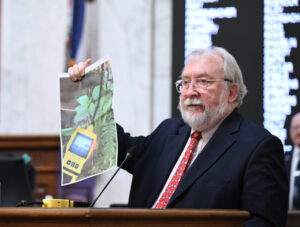
West Virginia Surface Owners’ Rights Organization co-founder and lobbyist Dave McMahon speaks during the public hearing for HB 5018 on Friday, Feb. 2, 2024. – Photo by Perry Bennett
HB 5018 – Community Air Monitoring
HB 5018 asserted that data collected from purple air monitors could not be used by the West Virginia Department of Environmental Protection (DEP) for regulatory or attainment purposes, which would have had a chilling effect on citizen monitoring. Citizen air monitoring allows community members to supplement data gathered by government agencies, including the EPA and the DEP. This engagement can lead to informed decision-making, advocacy for improved air quality regulations, and community-driven initiatives to reduce pollution. After a public hearing in February, two heated debates on the House floor, and much back and forth over whether the bill would run in the Senate Energy, Industry, & Mining Committee, HB 5018 finally died during the last week of session. We fought especially hard to defeat this bill and couldn’t have done it without your support. Thank you for your calls and emails to legislators. We’re grateful to the WV Rivers Coalition for their leadership on this critical issue!
SB 618 – Carbon Exchange Program
SB 618 would have created a state program for the sale and purchase of carbon offset credits, allowing the Division of Forestry to control the program and implement new and unnecessary rules and fees. This bill would limit landowners’ rights, ability to manage their land, and access to competitive carbon markets. SB 618 passed out of the Senate Government Organization and Senate Finance Committees before being introduced in the House, where it was referred to the House Finance Committee. The bill was never taken up in that committee. West Virginia landowners fought hard against this bill to protect their rights. Legislators also appeared to ignore the price tag of $3.5 million by attaching no fiscal note. Thank you to Jim Kotcon with the Sierra Club WV, Dave McMahon with Surface Owners Rights Organization, and Mike Jones with WV Public Lands for your work on this bill.
SB 688 – Wildfire Management on Public Lands
Defeating SB 688 was one of the most significant victories of the 2024 legislative session. This dangerous bill would have opened our public lands to widespread timbering and “economic development” for special-interest projects. It also would have permitted secret, noncompetitive bid contracts from out-of-state interests, threatening the beauty and value of our public lands. The bill passed through the Senate Economic Development Committee and went to the floor as a Committee Substitute. Senator David Stover’s amendment, which would have exempted state parks and rail trail lands from wildfire management contracts, was rejected. Luckily, the House Government Organization Committee never took up the bill.
We extend a huge thanks to West Virginians for Public Lands and WV Rivers Coalition for their leadership in generating public comments from across the state and sending them to legislators’ inboxes and voicemails. Your actions had a big impact!
SB 822 – Changing Carbon Exchange Agreement Laws
SB 822 attempted to change current carbon exchange agreements by imposing new taxes and unnecessary bureaucratic requirements on landowners who make income by keeping their lands untimbered. The bill would have introduced a new tax on carbon agreements – either 15% or 50%, depending on how severely the agreement restricts economic development and resource extraction on the land – and making BOTH the buyer and the landowner liable for the tax (plus income tax for the landowner). Additionally, the bill would have discouraged people in WV from participating in managed timberlands by potentially negating the property tax break that currently comes with participation in the program. The bill was sent to the Senate Rules Committee and did not survive past Crossover Day.
HB 5076 – Loosening Well-Plugging Regulations
HB 5076 would have loosened regulations on well plugging and prevented landowners from suing operators over abandoned unplugged wells. During a discussion of the bill in the House Energy & Manufacturing Committee, concerns were raised that it would act as a legal shield for Diversified Energy Co., the nation’s largest owner/operator of gas and oil wells. Under the legislation, the company could’ve taken up to 480 years to plug its wells. The bill passed through the committee, with only two opposing delegates, and died sitting in the House Judiciary Committee. Read more about the meeting and bill here.
Thank you to Dave McMahon for testifying against this bill in committee and to WV CAG for dubbing it the “Diversified Welfare Bill.”
As we reflect on another session gone by, what stands out most is not the failed bills or even the bad ones that passed through. In a conversation with a legislator during the final week of session, we thanked them for being an ally to us over the past sixty days. In return, they thanked us for our work and reminded us that our presence at the legislature was enough to keep industry and monied interests from running amok and unchecked. It reminded us that our work is not about constantly winning but about showing up and putting in the work year after year. Overall, we learned a lot that can and will be applied to future sessions for stronger lobbying strategies and partnerships. We had many great moments, like E-Day and the public hearing on HB 5018, that reminded us, our partners, and our lawmakers that we’re here to stay!
